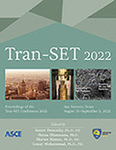Climate Change Impacts on Reinforced Concrete Deterioration for Texas Highway Bridges
Publication: Tran-SET 2022
ABSTRACT
Texas has more than 55,000 bridges, where more than 50% of the bridges are over 40 years old, approaching their design life span with increasing maintenance and rehabilitation needs. Despite the ever-increasing traffic demand due to population increase and urbanization, bridge assets are also exposed to more intense environmental threats due to climate change, degrading their structural condition and traffic carrying functionality. This study examines the climate change impacts on the deterioration of transportation infrastructure, particularly concrete highway bridges in Texas. Mechanics-based reinforced concrete deterioration models are coupled with state-of-the-art climate change forecasts to study the influence of climate change on the deterioration of concrete highway bridges. Sensitivity analyses are conducted via Monte-Carlo simulation to quantify time-dependent carbonation and chloride-induced corrosion damage risks in three representative locations (i.e., Houston, Dallas, and Amarillo) in Texas. The findings can better inform decision-making for climate adaptation in bridge asset management.
Get full access to this article
View all available purchase options and get full access to this chapter.
REFERENCES
Brekke, L., Thrasher, B. L., Maurer, E. P., and Pruitt, T. (2013). Downscaled CMIP3 and CMIP5 climate and hydrology projections: Release of downscaled CMIP5 climate projections, comparison with preceding information, and summary of user needs. US Dept. of the Interior, Bureau of Reclamation, Technical Services Center, Denver.
Department of the Interior. (2021). “Gridded Observed Meteorological Data: 1949-2010.” <https://data.doi.gov/dataset/gridded-observed-meteorological-data-1949-20101>(Jun. 25, 2022).
Du, A., and Ghavidel, A. (2022). “Parameterized Deep Reinforcement Learning-enabled Maintenance Decision-support and Life-cycle Risk Assessment for Highway Bridge Portfolios.” Structural Safety, 97, 102221.
FHWA (Federal Highway Administration). (2014). “Impacts of climate change and variability on transportation systems and infrastructure: The gulf coast study, phase 2, Task 3.2: Engineering Analysis and Assessment.”
Global Monitoring Laboratory. (2022). “Trends in Atmospheric Carbon Dioxide.” <https://gml.noaa.gov/ccgg/trends/mlo.html>(Jun. 25, 2022).
Houghton, J. T., Ding, Y., Griggs, D. J., Noguer, M., van der Linden, P. J., Dai, X., Maskell, K., and Johnson, C. A. (2001). Climate change 2001: the scientific basis: contribution of Working Group I to the third assessment report of the Intergovernmental Panel on Climate Change. Cambridge university press.
Hu, N., Burgueño, R., Haider, S. W., and Sun, Y. (2016). “Framework for Estimating Bridge-Deck Chloride-Induced Degradation from Local Modeling to Global Asset Assessment.” Journal of Bridge Engineering, 21(9), 06016005.
IPCC. (2014). Climate Change 2014: Synthesis Report. 1–151.
IPCC. (2019). “SRES emissions scenarios.” <https://sedac.ciesin.columbia.edu/ddc/sres/>(Jun. 25, 2022).
Khatami, D., and Shafei, B. (2021). “Impact of Climate Conditions on Deteriorating Reinforced Concrete Bridges in the US Midwest Region.” Journal of Performance of Constructed Facilities, 35(1), 04020129.
El Maaddawy, T., and Soudki, K. (2007). “A model for prediction of time from corrosion initiation to corrosion cracking.” Cement and Concrete Composites, 29(3), 168–175.
Mullard, J. A., and Stewart, M. G. (2011). “Corrosion-induced cover cracking: New test data and predictive models.” ACI Structural Journal, 108(1), 71–79.
Nakicenovic, N., Alcamo, J., Davis, G., de Vries, B., Fenhann, J., Gaffin, S., Gregory, K., Grï, A., Jung, T. Y., and Kram, T. (2000). IPCC: Special Report on Emissions Scenarios. Grid-Arendal.
Robelin, C.-A., and Madanat, S. M. (2007). “History-Dependent Bridge Deck Maintenance and Replacement Optimization with Markov Decision Processes.” Journal of Infrastructure Systems, 13(3), 195–201.
Savonis, M., Burkett, V. R., and Potter, J. R. (2008). “Impacts of climate change and variability on transportation systems and infrastructure: The gulf coast study, phase 1.”
Soliman, M., and Khandel, O. (2018). Sustainability-Based Long-Term Management of Bridges under Multi-Hazard Exposure.
Stewart, M. G., Wang, X., and Nguyen, M. N. (2011). “Climate change impact and risks of concrete infrastructure deterioration.” Engineering Structures, 33(4), 1326–1337.
Stewart, M. G., Wang, X., and Nguyen, M. N. (2012). “Climate change adaptation for corrosion control of concrete infrastructure.” Structural Safety, 35, 29–39.
TxDOT (Texas Department of Transportation). (2020). Report on Texas Bridges. Bridge Division Texas Department of Transportation.
U.S. Global Change Research Program. (2022). “Emissions, Concentrations, and Temperature Projections.” <https://www.globalchange.gov/browse/multimedia/emissions-concentrations-and-temperature-projections#:~:text=TheRCP2.6scenariois,DatafromCMIP3andCMIP5> (Jun. 25, 2022).
Wang, F., Lee, C.-C. B., and Gharaibeh, N. G. (2022). “Network-Level Bridge Deterioration Prediction Models That Consider the Effect of Maintenance and Rehabilitation.” Journal of Infrastructure Systems, 28(1).
Wang, X., Stewart, M. G., and Nguyen, M. (2012). “Impact of climate change on corrosion and damage to concrete infrastructure in Australia.” Climatic Change, 110(3–4), 941–957.
World Climate Research Programme. (2022). “Coupled Model Intercomparison Project 5 (CMIP5).” <https://esgf-node.llnl.gov/projects/cmip5/>(Jun. 25, 2022).
Yang, D. Y., and Frangopol, D. M. (2018). “Risk-Informed Bridge Ranking at Project and Network Levels.” Journal of Infrastructure Systems, 24(3), 04018018.
Yoon, I. S., Çopuroǧlu, O., and Park, K. B. (2007). “Effect of global climatic change on carbonation progress of concrete.” Atmospheric Environment, 41(34), 7274–7285.
Information & Authors
Information
Published In
History
Published online: Dec 13, 2022
Authors
Metrics & Citations
Metrics
Citations
Download citation
If you have the appropriate software installed, you can download article citation data to the citation manager of your choice. Simply select your manager software from the list below and click Download.
